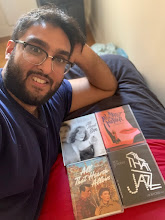When I first saw the 2nd trailer for Gone Girl, man, I was hooked like a fish. Here it is below:
After seeing the movie twice, man, I love it even more. The trailer does a great job selling the film with a montage of cryptic moments from the film. The trailer sells Gone Girl as a "woman trapped by dangerous husband" Gothic horror story in the vein of Gaslight, Suspicion and in some ways Rosemary's Baby (all great films you should absolutely watch). I have to admit I find the Gothic horror story very effective and seductive.
And so when I actually saw the movie, I was just blown away by just how much the trailers lied to me. The idea of false narrative, not entirely new to cinema or fiction for that matter, is a very powerful one nonetheless. It plays with viewer expectations. Because of course we are quick to believe in the Amy presented in the diary (which I'll call Amazing Amy from here on out)--the beautiful blonde victimized by her violent husband. It's a narrative that plays on societal expectations for how these stories go.
Gone Girl reminds me of another film with a false narrative, one which even plays with the Gothic horror genre: Alfred Hitchcock's 1958 masterpiece Vertigo (Click here for my analysis of the film, which happens to be my favorite film of all time).
Vertigo is also a film where during the first half, you're seeing the female lead through the male lead's perspective and then are forced to confront the reality behind the male perspective. (For a plot summary of Vertigo, click here but really, stop reading and watch it. Then come back.)
Both films feature a mid-film twist that completely reframes the first half. Amazing Amy in the diary is a creation by the real Amy for the purpose of trapping husband Nick into a guilty murder verdict. So too is "Madeleine" a creation by Gavin Elster for the purpose of making a murder look like a suicide from the outside. Both films use Gothic horror and seductive, death-obsessed Gothic language to trick the viewer into seeing the female lead in a different way.
The first half of Vertigo offers Madeleine as the possessed woman with suicidal tendencies who must saved and solved by Scottie Ferguson. Madeleine tells Scottie: "It's as though I were walking down a long corridor that once was mirrored. And fragments of that mirror still hang there. And when i come to the end of the corridor, there's nothing but darkness. And I know that when I walk into the darkness, that I'll die. I've never come to the end. I've always come back before then, except once."The reveal that "Madeleine" is actually a shopgirl Judy Barton playing a part and the whole thing was a setup is shocking.
Amazing Amy in Gone Girl is also a classic heroine in Gothic horror fiction. Amazing Amy writes in her diary: "I will practice believing my husband loves me... but I could be wrong. I feel like something to be jettisoned if necessary. I feel like I could disappear. I've finally realized that I am frightened of my own husband. The man of my dreams, this man of mine might kill me. This man may truly kill me." You just don't question her claims of emotional, sexual and physical abuse at the hands of Nick and are quick to find him guilty even as he protests. The twist in Gone Girl works because our society finds it hard to imagine a man being victimized by a woman.
 |
| "I will practice believing my husband loves me...but I could be wrong." |
The genius of these moments from the films is that they are both performances that are specifically tailored to elicit a reaction from both the male lead and the audience. Everyone is forced to analyze why we're reacting the way we did.
What separates Judy/"Madeleine" and Amy/"Amazing Amy" from each other is one key word: agency. Judy is coerced into becoming Madeleine first by Gavin Elster and again by Scottie himself. You can argue that with Scottie she chooses to do it out of love for Scottie and her continuous but unsuccessful refusals are as much agency as 1950s patriarchal culture would allow.
 |
| "I was the tool, you were the victim of a man's plan to murder his wife." |
In the 56 years between Vertigo and Gone Girl, we are becoming a little more comfortable with a female character wreaking havoc on her own rather than just being a tool for a male character's havoc and for me that a feminist achievement. Both films seek to deconstruct the classic Gothic horror heroine to reveal a more complicated woman by exploiting Gothic horror language and movie audience expectations. I personally find both films are extremely fascinating on their own and as companion pieces (and not just because they're made by 2 of my top favorite directors).
But seriously go see both Gone Girl and Vertigo as soon as possible!
Like what you read? Please like my blog at Facebook.com/MathurMarquee. Also, follow me on Twitter @HippogriffRider. Agree? Disagree? Sound off in the comments below!




2 comments:
Great comparisons between the movies! But additionally, do you think that Amy's "agency" could be her parents' creation of Amazing Amy and the pressures she faced (both blatantly and subconsciously) because of those books?
@Varsha, most definitely! Amy's parents are truly despicable and yes, her psychological issues can be traced back to them (although my knowledge of Freudian analysis is very rudimentary). The effect of the Amazing Amy books is still coming from her own internal subconscious; Amy still is acting at her own behest. She came up with and researched her plan and then acted it out.
Post a Comment